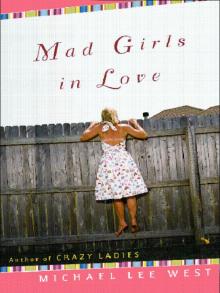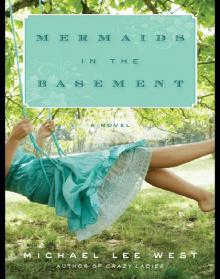- Home
- Michael Lee West
Mermaids in the Basement Page 17
Mermaids in the Basement Read online
Page 17
All I remember about that winter was ice and cold. The man on TV said a arctic front had swooped down from Canada, and temperatures shot down into the single digits. All over the Gulf Coast, water pipes bursted and azaleas froze solid. It was mighty strange weather for this part of the country, and I thought it was a sign of worse things yet to come.
Then Shelby decided to drive over to Perdido Key, Florida, and check on her daddy’s old beach house. “I’m worried about his pipes,” she said.
“Will Louie be coming, too?” I asked, trying to be sly.
“He’s on duty. It’ll just be me, you, and Renata.”
During the drive to Point Clear, Shelby didn’t stop talking. Her thick hair was stylishly brushed into a one-sided ponytail, and I wondered if she’d fixed it herself, then shook the thought from my mind. The rest of her was shabby—her black wool pants were all beat up, and that moth-bit gray sweater looked like rats had been sucking on it. She wasn’t a slouchy dresser. She and Louie didn’t have much money, even with all that extra hospital work he did. But that baby wore a pink snowsuit that Honora and Isabella had bought at an exclusive children’s shop in Mobile. Honora believed that money didn’t make people happy, but it sure was a blessing when you had a beautiful grandchild. She had the bestest time buying clothes for that baby. Although she was really a toddler.
When we pulled up to Honora’s house, she flung open the door and let out a whoop, then she clapped her hands. Shelby set the child down, and she ran straight to her grandmother, the snowsuit whisking.
“Come into the kitchen where’s it warm,” Honora said. She dished up steaming bowls of red beans and rice, then opened a bottle of red wine. I didn’t get suspicious until Kip showed up, smelling of cold air and hairspray. He and Shelby started drinking and talking, having a little too much fun. Honora opened another bottle of wine. I had all but forgot about the dancing and flirting at Dr. Nigel’s birthday party. Kip had gone back to Fairhope, coloring hair and giving permanents, and Shelby went back to Covington. But now, listening to them talk and watching the sparks that shot out of their eyes, I realized that their calf-love hadn’t ended in the Carolinas, it was just getting started.
A dirty aura hovered near the ceiling, gray smoke all shot through with brown. Part of itself had glued itself to Kip; the other part was curled around Shelby, only it didn’t look like smoke, it was peaked and foamy, just like the water in the Pontchartrain before a hurricane hits.
Keeping my eyes on them, I spooned up red beans. Kip’s hairstyle was loose and free. He’d growed it out into a long, glossy ponytail, and it ran like dark water down between his shoulders. He weren’t no hippie, but he verged on being one. His eyes lingered on Shelby, and I felt tender waves rolling all around the room. Some of those waves crashed into the aura, mixing it all together.
Honora didn’t seem to notice. She was all wrapped up in that baby, carrying her around the kitchen, trying to feed her oatmeal cookies. Shelby brought out pepper cheese and crackers and made a pot of coffee, but they switched to gin and tonics, talking about the cold snap. “I heard the bay is frozen,” said Shelby.
“Not solid,” Kip said. “Just the top.”
“Ain’t that bad enough?” I asked. “Them poor shore birds’ feets got stuck to the ice and people tried to save them, but they had trouble getting them free.”
“Speaking of trouble,” said Shelby, glancing at her Timex, “I should check on Daddy’s place.”
“You’re not going alone, are you?” Kip stood up, then fell back into his chair. He stared at his empty glass and laughed. “Hell, I’m drunk.”
“Me, too,” said Shelby.
“Y’all shouldn’t drive,” said Honora, handing Renata a box of crayons and a Cinderella coloring book. The toddler picked a orange stick, then sprawled on the floor. “Just stay here tonight, Shelby,” Honora added. “You can check on your daddy’s house tomorrow.”
“He’s worried sick,” said Shelby, and glanced over at me. “Gladys, you’re sober. Will you drive me?”
“I reckon I could,” I said, silently cursing rich people and their beach houses. I wondered why Shelby’s daddy couldn’t tend to his own house. He’d bought it for fishing trips with his buddies.
“It’s too cold to go anywhere,” Honora said.
“I’ll go with y’all,” said Kip.
“Great!” Shelby clapped her hands.
“No, that’s all right,” I said. “Just us girls will go.”
“I’d better go along in case you all have a flat tire,” he said.
“It could happen,” said Shelby.
“Humph,” I said.
“Drive carefully,” called Honora, then she got down on the floor and began coloring in the book with her granddaughter.
By the time we drove up to Perdido Key, it was sunset, and I was half crazy from all the whispering and giggling in the backseat. We passed the fire department and a condominium complex. I turned up the sandy driveway, then herded Kip and Shelby into the house. While they mooned at each other, I checked the faucets. Don’t ask me how, but the pipes hadn’t burst. But the house had been built in the 1950s, and it was solid, with knotty pine ceilings.
Kip found a bottle of Wild Turkey in the pantry and poured a round of drinks. “Y’all put that away,” I said, thinking of how much they’d already drunk, and of the long drive back in this cold. “Come on and join us, Gladys,” said Kip.
“Ain’t got time.” I turned up the heat and flung open the cabinets under the kitchen sink. I pushed back the yellow curtain. Outside, the moon was rising over the dark purple ocean. The sky and water were empty; even the shorebirds had the sense to stay out of the frigid air.
“Let’s go see if the bay is frozen,” Shelby said.
“Yes, let’s,” said Kip.
“No!” I whirled around. “Don’t you dare!”
“We’re just going across the road.” Kip was helping Shelby into her coat. She staggered, and I saw how drunk she was. Kip, he saw, too, and grabbed her arm.
“Just lean on me,” he said, pushing her out the door. Then, over his shoulder, he said to me, “We’ll be back in ten minutes.”
“Make it five,” I snapped.
I walked around the house, making double sure the faucets were dripping. I even checked the hot water heater. I kept looking out the windows, hoping I’d see them hurrying back. The long sandy driveway was empty. I turned on the TV and listened to the Pensacola evening news. But I couldn’t stop worrying. Shelby was acting plain silly. She was in the grip of a crush, but was it love? I didn’t think it had gone past the smooching stage. When we were in Pinehurst, I will bet you that kissing had took place. I knew the “why” of her crush, just not the when, where, and how.
Louie’s doctoring was too huge for Shelby. Many a time I heard her say that she’d married a man just like her father. Then here came Kip—no ringing phones, no beeping—and he couldn’t take his eyes off her. She perked up like gerbera daisies you’d forgot to water. So, that was the why of Shelby and Kip. But I just didn’t know how far they’d took it, or what all had gone on since Pinehurst.
This was a fact: Shelby wasn’t a loose woman, and Kip wasn’t a home wrecker. However, Isabella had been dead right about one thing: he was a self-centered mama’s boy. When the Pensacola weatherman came on, promising warmer temperatures, I said Amen, then I peeked out the kitchen window. The sky had turned black, all speckled with cold stars.
A little voice started up inside my head, and it was saying, Gladys, girl—this has gone on too long. You better go after them.
I buttoned my coat and stepped outside, my shoes crunching on the froze sand. I darted across the street to a ugly condominium complex. In the back of those apartments was a dock where the people kept yachts. Some of the boats was hoisted up, the others jutted crookedly from the frozen water, icicles hanging from the sides.
A light at the end of the dock shown down on the froze water. It reminded me of rumpled sheet met
al. I saw something moving in the middle of the bay. It was two people, and they were sprawled out on the ice, clothes flung off everywhere. They were bouncing, giving off steam and a humming noise, more like a chant or a prayer, real pretty noises, what Honora would call “beguiling.”
I walked toward the sounds. Miss Shelby’s blond hair fanned on the ice. Kip’s trousers hung low, wrinkled around his knees, his lower body circled by Miss Shelby’s long, white arms. Her fingers dug into his fleshy buttocks. Their froze breath hung in the air.
I went red-hot with anger and covered my eyes. I wanted to grab her ankles and drag her back to her daddy’s cottage. They hadn’t seen me. So I stepped onto the ice. I heard a pop, and my shoe sank down a little. It scared me bad, so I lifted my foot and stepped back to the shore.
But the damage done been done. I heard a crackling sound, loud as a shotgun. All around them, just under the surface, twig-shaped lines spread through the ice, making a popping noise. The piece of ice they was laying on broke, floating for a moment, with black water lapping onto Kip’s legs and Shelby’s nakedness. They rose up, then pulled apart. He reached for a solid chunk, but his arms broke it to pieces. His hands splashed into the water. Then he lunged to a large, solid layer and heaved himself out of the water, his wet trousers tangled and soggy around his ankles. Shelby crouched on the ice, then she stood up and gingerly took a step. The ice shattered, and she fell screaming into the water.
“Get her!” I screamed. “Kip, she’s gone under, she’ll drown.”
He lay motionless on the ice floe, his face hidden in his arms, and couldn’t—or wouldn’t—look up. Behind him, Shelby’s head broke through the surface. She gasped for air, flailing at the ice, her arms churning water.
“You, Kip Quattlebaum!” I yelled. Still, he did not move. I whispered a Hail Mary. Then I pulled off my shoes and shrugged out of my coat. I crossed myself and slogged forward, not caring if I fell. I grew up on a bayou, and while I didn’t know anything about ice, I knew how to swim.
Shelby screamed again. “Hold on,” I said. “Gladys’s coming.” Halfway to her, I stopped. The ice looked thinner. I took a small step and cracks zigzagged around my shoe like when you hit a hard-cooked egg with a fork. I hunkered down, then scooted across my stomach until I was close to the gaping hole where Shelby was flailing. I stretched out both hands, but she was still too far away. I could hear her praying to Saint Jude and Mary Magdalene. From the condominiums, terrace lights snapped on and people looked through sliding doors. A man hollered, “Help is on the way.”
“Shelby?” I called. My voice sounded tight and raspy. “Dog-paddle to me. And do it gentle, or we’ll both go under.”
She glanced crazily over the ice toward Kip. Her arms moved in slow motion, real clumsy, and I saw that she was too froze to swim. Her lower jaw moved like she was singing hymns, but her lips were dark blue, almost purple. I glanced back at Kip. He was breathing, but he still wouldn’t look at me. I wondered if he’d passed out—not from the drink or the cold, but from fright.
Then I heard a siren, and a minute later, a rescue truck roared up. The siren snapped off. Red lights wheeled over the boats and the glossy bay. Two police cars swerved into the parking lot, tires crunching over icy gravel. Right then, I knew they were going to make a fuss. So did Kip.
“Shit,” he said. He rolled over and yanked up his trousers. From the water, Shelby began to shriek. I raised my hands and waved to the rescuers. They hopped out of the truck, gripping a big orange inner tube, a rope dangling down.
“Over here,” I yelled, then I whispered a prayer to my Jesus. “‘Death and life are in the power of the tongue: and they that love it shall eat the fruit there of. Proverbs 18:21.’”
An ambulance screeched into the parking lot, followed by a TV news van. One of the rescuers led me off the ice and wrapped a blanket over my shoulders. Somebody else draped a blanket around Kip. Two others crawled onto the ice, tossing a rope ladder out to Shelby. Each time, she glanced up, her eyes unfocused. She looked dozy-headed, like she’d just woke from a hard sleep. One arm clutched a large chunk of ice, the other floated in the water. “C-cold,” she stammered.
“Don’t bump her or she’ll slip under and drown,” said one man.
“Just grab the rope, honey,” said another.
Shelby’s hand rose up, shaking and mottled, then crashed back onto the ice, breaking off a chunk. Another fellow disappeared into the truck, and minutes later he came out wearing a black skin diving suit. On his hands were gloves, and on his feet was rubber fins. The fins slapped onto the ice. All around him, it cracked like gunfire.
“What’s her name?” he asked Kip, but before he could answer, I said, “Shelby. Her name is Shelby.”
He slid into the black water and kicked past ice chunks. A sheet broke off and floated dangerously close to Shelby. I watched the rescuer swim over to her. Ice was stuck to her chin and ears, and all caked in her hair. “Okay, Shelby,” he said. “You’re going to be fine, you hear? I’ve got you. You’re safe.”
The diver swam up beside her. From the ice, one of the men threw out the rope. The diver tied it around Shelby, forming a harness under her arms and between each leg.
“Steady now, pull her out,” shouted the diver. The police grabbed the rope and helped the rescue men. They dragged Shelby out of the hole. She was naked from the waist down.
One of the men wrapped her in blankets, then carried her to the ambulance. I did not see what happened after that, except I heard the door slam and watched the ambulance blast out of the parking lot, into the road. I shut my eyes and listened to the siren. A news reporter asked me if I’d give a statement. I pushed them aside.
“We won’t show your face,” he said. “We’ll just show your shoes.”
“Everybody know what kind of shoes I wear,” I snapped, then I grabbed Kip’s arm and led him toward the road. “Just keep walking,” I said. “And don’t open your mouth unless you want it sewed shut.”
Kip pressed his lips together. I shut my eyes and quoted Song of Solomon 8:7: “Many waters cannot quench love, neither can the floods drown it: if a man would give all the substance of his house for love, it would utterly be condemned.”
And it sure enough was.
Chapter 25
JUST OUTSIDE THE GARDEN OF EDEN
I stood on the pier, the wind snapping my blouse, wondering how many other secrets my mother had taken to her grave. No matter what she had done, she could have told me; at least, I wanted to believe that if she had, I wouldn’t have judged her the way I’d judged my father. I didn’t have all of the puzzle pieces, but even so, I felt a little sorry for him. If only I could talk to him about Mama. If only he could tell his side of the story.
Reaching up with one hand, I wiped my eyes. I missed my mother. I missed her throaty laughter, and the way she’d hug me whenever she passed through a room. I wanted to think that Daddy missed her, too.
The wind shifted, and the surface of the bay rippled: the tide was going out. Growing up on the water, I’d learned how to read the weather. Unfortunately, I’d always lacked the talent to understand the psychological currents of the people I loved.
Behind me, I heard footsteps on the dock. I glanced over my shoulder and saw Honora. She gripped a brown leather scrapbook. Cracking it open, she pointed to an invitation. “I want to show you something. When Chaz turned fifty, I gave him a big party over in New Orleans. He specifically requested a faux funeral, so that’s what he got.”
I tilted the book, squinting at the cursive print.
Dr. Louis Charles “Chaz” DeChavannes
CORDIALLY INVITES YOU TO HIS FAUX FUNERAL
St. Louis Hotel
211 Rue Beinville
New Orleans, Louisiana
Seven p.m. to Midnight
September 6, 1975
RSVP
“I remember that party,” I said.
“Well, you should. It was the day you started talking again.”
“Again? When did I quit? I was a chatterbox.”
“You were until your mama fell though the ice.”
“I don’t remember that.”
“You’ve probably repressed it. All the screaming between your daddy and mama probably left a mark on you. You just buttoned your lips and refused to talk.”
“For how long?”
“The first time? Almost a month,” said Honora. “Then you got over it. Children are resilient, thank heavens; but only to a point. Each time your mama and daddy fought, you’d lapse into silence. The longest time you went without talking was during the summer of ’75. But you snapped out of it after the faux funeral.”
Honora dumped the scrapbook into my arms. “I’ve got to fry chicken. You just stay out here and ponder awhile.”
I sat down on the edge of the pier and balanced the scrapbook on my lap. A plastic sheet covered the invitation. I peeled back the plastic, then pulled out the card. I remembered a hot June night in 1975, when I was catching fireflies in the Covington yard. Inside, Mama and Daddy started yelling. I didn’t know what had started the fight. I just heard the word “Kip,” or maybe it was “Chip.” Right before the fight, Mama had eaten Lay’s potato chips, so I figured that was it. I ran onto the porch and crouched beside the screen door, listening to them fight.
“I said I was sorry,” Mama yelled. “I’ve killed myself, trying to please you.”
“I’ll never forgive you,” Daddy said, “especially when you exaggerate.”
Daddy flung open the screen door, and I went flying across the porch, down the wooden stairs. I landed on my chin, biting through my lip and tongue. They drove me to the hospital for stitches. Because I wouldn’t stop kicking and yelling, the doctor and nurse wrapped me in a papoose.
On the way home, Mama held me in her lap. Daddy kept rubbing my arm, saying, “Baby girl, I’m so sorry. Do you believe me?”
“She can’t talk, Louie,” Mama said through her teeth. “She’s got five stitches.”

 A Teeny Bit of Trouble
A Teeny Bit of Trouble Mad Girls In Love
Mad Girls In Love Mermaids in the Basement
Mermaids in the Basement Gone With a Handsomer Man
Gone With a Handsomer Man